Nonviolence
1. How to Talk to Climate Change Skeptics in Your Church
This weekend, the People’s Climate March hits Washington, D.C., and sister marches are planned throughout the country. But 7 in 10 people don’t talk about climate change with friends and family. Here’s how to start.
2. Women Are Dying Because Doctors Treat Us Like Men
Marie Claire’s Kayla Webley Adler digs into the systemic reasons behind why female patients' symptoms are less likely to be taken seriously by doctors, and women are more likely to be misdiagnosed, have their symptoms go unrecognized, or be told what they're experiencing is psychosomatic.

With the blessing of Pope Francis, Cardinal Blase Cupich on April 4 unveiled an anti-violence initiative for this beleaguered city that will be underscored by a Good Friday procession, using the traditional stations of Jesus’ way to the cross to commemorate those who have lost their lives in street violence.
Cupich said he was inviting civic, education, and religious leaders, and “all people of good will,” to take part in the April 14 “Peace Walk” through the heart of the violence-scarred Englewood neighborhood.

St. Valentine came from a long Jewish and Christian tradition of national resistance based on love. Following Jesus, it resists unjust and unloving national policies. But it’s also a love that refuses to demonize those who enact those policies. Rather, like Jesus teaches, it’s a love that embraces all people, including those we call our enemies.

We march on Jan. 17 because it is the 40th anniversary of the first "modern-era" execution, after our courts ruled in favor of the death penalty following a decade-long moratorium. On that day, Gary Gilmore was executed by firing squad in Utah in revenge for his murders of Max Jenson and Ben Bushnell. Since then there have been 1,442 other executions. We will hold 40 signs, one for each year since 1977, with the names of those executed each year. We will also carry roses for the victims — both those who have been murdered and those who have been executed — declaring that violence is the disease … not the cure.

So much is at stake here at the dawn of the year 2017. The fate of the planet is in the balance as never before, as is the very integrity of our faith. We cannot waste our time hoping on a faraway unimaginable heaven where there is no war and baby Jesus sleeps safely in his manger.
What we desperately need is the disarmament that Christians and other seekers of peace throughout the world — from Dorothy Day to Dr. Martin Luther King, Jr. — have prayed and struggled for.

In a time of anti-immigrant fervor, religious distrust, and high political polarization, the peace-building Mennonites in Harrisonburg provide one robust model of how to transcend nationalism and bridge divides. Though relatively modest in size, they are showing how even a small group can affect major, positive change, shaping the hearts and minds of the local ecosystem.

If I’m completely honest, I’ve been really discouraged as of late. A major source of my discouragement has been the way the American evangelical church (a tribe I have identified with for most of my life, so my critique and exhortation will be directed there) has chosen to engage the world in this season marked by division, violence, and trauma. Now, I admit I’m speaking in generalities, but rather than being the healing balm to society’s gaping wounds, we have often contributed to the bleeding by either withdrawing in fear or adding fuel to the violence.
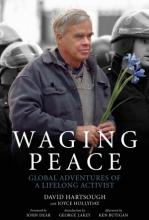
WHAT LIVES THESE two authors have lived and what lessons they can teach us! Reading David Hartsough’s lively memoir immerses us in the great peace and justice events of the last several decades. Colman McCarthy’s fascinating interchanges with high school and university students propel us into a hopeful future as we see how young minds are stretched and carry lessons learned into the world.
Hartsough’s FBI file started when he organized his first anti-nuclear protest at age 15, and it may be growing still as he directs Peaceworkers, a nonviolent training and accompaniment NGO based in San Francisco. In between are 60 years of peace work in the U.S. and the flashpoints of the world, always bringing the message of the necessity and efficacy of nonviolent direct action. In Waging Peace he relives the adventurous life of a professional peaceworker as well as the silent efficacy of his family’s tax resistance and tradition of simple living.
Whether disarming with words a knife-wielding segregationist opponent at a Virginia lunch counter, blockading with a canoe a weapons ship bound for Vietnam, or traveling to war zones, Hartsough has faithfully carried forward his commitment to nonviolence. Sometimes visiting conflict sites before they reach the radar even of other peace people, he writes of going to Cuba, Russia, Yugoslavia, and the Berlin Wall while still a college student, to Central America during the ’80s, and later to Gaza and other war zones.
In 1999, after trying unsuccessfully to persuade the world to support nonviolently the beleaguered Kosovars and thus avert a Serbian bloodbath, Hartsough attended a peace conference in The Hague. There he met Mel Duncan, and together they founded the Nonviolent Peaceforce, now the largest of several worldwide movements of accompaniment for nonviolent activists.
In California, Hartsough worked to launch the huge Abalone Alliance against the Diablo Canyon nuclear power plant and campaigned against the development of nuclear weapons at the University of California’s Lawrence Livermore National Laboratory. In this century, Hartsough was one of the first to be arrested for protesting drone warfare at Creech Air Force Base.

I wish that the testimony of my friends who literally beat guns into garden tools could be part of the courtroom proceeding. They urge us to make guns and other weapons unnecessary, using raw tools of compassion and service to heal the conflicts in which weapons are used. I wish my young Afghan friends here in Kabul, who live under constant surveillance of Unmanned Aerial Systems, could testify about their desire to refine tools of peace making and constructive service.

The name Berrigan helped keep the possibility of coming back to my Christian aith alive. Just like the black churches that took me in, here were some Christians who were saying and doing what I thought the gospel said that nobody in my white evangelical world was. I believe the witness of the Berrigans literally helped keep my hope for faith from dying altogether.

IN DECEMBER 2007, Naomi Mwangi, a Christian, fled her home in Kisumu, Kenya, as men with machetes attacked towns across the region. For five weeks violence raged nationwide. When the bloodshed ended, more than 1,300 Kenyans were dead and another 650,000 had been displaced. Mwangi and her family ended up living in the Maai Mahiu refugee camp, south of Nairobi. She was 12 years old.
Mwangi is coming of age in a society with ethnic violence in the background, extremist violence in the foreground, and massive economic inequality. Africa has the highest concentration of young people in the world and more than half of them are unemployed. Mwangi wanted something different—she wanted to work for peace.
Now 21, Mwangi is a leader in grassroots peacemaking campaigns that seek to end conflicts between the 42 ethnic groups in this majority-Christian country. The 2007 election violence pitted Christian against Christian, as ethnic ties trumped religious affiliation. Even now, during elections, Mwangi told Sojourners, “Leaders motivate youth to join in the political crisis ... to fight against another tribe.”
A major obstacle to social and economic stability among youth in Kenya is unequal distribution of government-issued identification cards. Kenyans need ID cards for everything from voting and university enrollment to obtaining grants for entrepreneurship programs. But historically, the ruling government doled them out as political favors, and they’ve often been denied to members of minority groups.
“There are plenty of applications at election time,” Mwangi said, explaining that the ID process is slowed down or delayed when it seems one ethnic group could tip the chances of a politician who represents a different group.
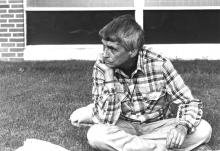
Dan Berrigan published more than 50 books of poetry, essays, journals, and Scripture commentaries, as well as an award winning play, The Trial of the Catonsville Nine, in his remarkable life, but he was most known for burning draft files with homemade napalm along with his brother Philip and eight others on May 17, 1968, in Catonsville, Md., igniting widespread national protest against the Vietnam War, including increased opposition from religious communities. He was the first U.S. priest ever arrested in protest of war, at the national mobilization against the Vietnam War at the Pentagon in October 1967. He was arrested hundreds of times since then in protests against war and nuclear weapons, spent two years of his life in prison, and was repeatedly nominated for the Nobel Peace Prize.
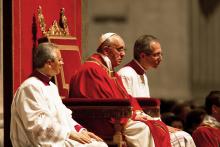
For over 1,500 years, the Catholic Church has promoted “just war theory” as a way to determine in what cases a war can be considered morally justifiable. But all of that may change.
In an interview, Cardinal Peter Turkson of Ghana said that it is “plausible” that Pope Francis may write a new encyclical updating Catholic teaching on war and peace, an update that could include a retreat from just war theory. Francis’ last encyclical, “Laudato Si,” made waves for its condemnation of capitalism and call to address climate change.

The German pastor was executed by the Nazi regime at Flossenbürg concentration camp on April 9, 1945, just two weeks before the United States liberated the camp. When he died he famously remarked to another prisoner, "This is the end — but for me, the beginning."

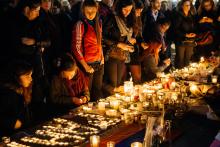
"Instead of preaching, perhaps what is more appropriate is, in fact, confession of how hard it is to actually love our enemies,” says Pastor Jarrod McKenna.
Though this video reflection for Common Grace’s Love Thy Neighbour campaign was filmed a few weeks ago, its pre-scheduled release today goes right to the heart of enemy love and offers a Christian response to terrorism in the days after shocking attacks in Brussels, Istanbul, and elsewhere.
“This teaching is the most often quoted teaching of the early church, because it is the teaching that sums up the cross the easiest,” he says.
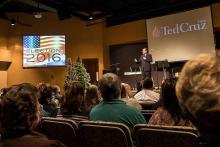
Ted Cruz ended Monday night with a yuuuuge victory over Donald Trump in Iowa. (Sorry, had to do it!) Religion played a big role in Cruz’s victory. The New York Times reports that Cruz’s victory was “powered by a surge of support from evangelical Christians.”
For his part, Cruz reaffirmed his connection with his evangelical supporters by evoking divine favor upon his victory. “God bless the great state of Iowa! Let me first say, to God be the glory.”
But I can’t help but feel uneasy about the God proclaimed by the so-called "evangelical vote." That’s because, when it comes to their evangelical faith, they have an identity crisis.

If we see our interests and needs as more important than the interests and needs of others, then we’ll never have peace in our personal lives or in our world. Peace requires a recognition that we’re all equally beloved children of the same loving God.
It involves recognizing that we all matter equally — and then doing some introspection to see if we’re living up to it in our various relationships.
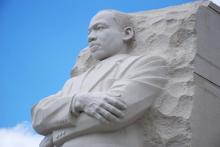
As the #BlackLivesMatter movement reminds us, the civil rights struggle is far from over. The blood, sweat, and tears of our 20th-century civil rights heroes must be followed up by the clear-eyed resolve of a new generation. Ideally, celebrations like Martin Luther King Day should help to sustain this resolve, energizing us for the hard work ahead.
That being said, I suspect that King would not be too thrilled about MLK Day.

We live in a culture that not only glorifies violence, but often celebrates its use against the “enemy" as the truest form of heroism and bravery. While I won’t get into the debate of whether violence is ever justified to preserve life (a much bigger conversation extending far beyond an 700-word post), I will say I’m deeply troubled by our assumption that violence is the only way to respond to a real or perceived threat.